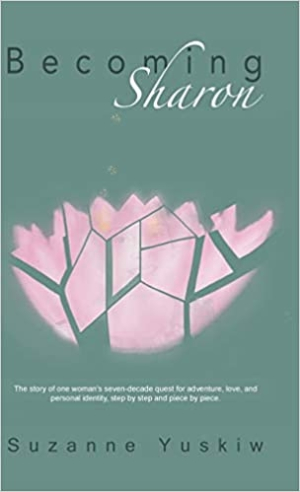Becoming Sharon
In the rich historical novel Becoming Sharon, a woman experiences joy, disappointment, and continual self-discovery.
In Suzanne Yuskiw’s historical novel Becoming Sharon, a septuagenarian revisits her experiences with childhood polio, social awakening, loves won and lost, and friendship.
Raised by her mother and grandmother, Irish Catholic Sharon grew up sheltered in 1940s Boston. She contracted polio in 1949; through her hospital stays, she gained strength. She also faced bullying because of her leg brace, though. The book’s brisk coverage of her high school years is used to segue into the 1960s, when further independence and chaste relationships shaped her perspective.
Written in the style of a memoir, the book is linear but episodic. It focuses on years and incidents in Sharon’s life, covering some in sharp terms, but glossing over others. Few other people are strong presences in her early life; instead, her friends and family are captured via nostalgic impressions, their primary role to highlight how Sharon formed her determined personality, free from self-pity about her disability.
Period details help to depict Sharon’s college coming-of-age as a period of contentment. The book’s pace is gradual, describing everyday events without much momentum. This changes around 1968, with Sharon’s work teaching high schoolers in Virginia. She hears about Martin Luther King Jr.‘s assassination and witnesses its aftermath among her students. She, a white woman in the South in the wake of riots, is a sensitive presence. When she encounters a radical Black student, it’s an educational moment. Sharon matures as she becomes an ally, and her story becomes a striking window into a charged era.
But the portions of the book that follow the 1960s abbreviate milestones in Sharon’s life. Her marriage and motherhood are covered in a handful of pages, and the story stagnates by 1980. She meanders into spirituality and therapy, but these experiences are also covered in fleeting terms. She goes with friends on a trip to Costa Rica that uncovers secret envies and an unexpected misadventure; in the book’s related standout, careful scenes, the women navigate their changing emotions with whimsy.
Sharon’s widowhood and re-entrance into dating are among other late incidents that lead to insights about her concept of herself, though the men with whom she is in relationship form a secondary succession; their passage through Sharon’s life is repetitive. The novel comes to read like an album of Sharon’s life; in each stage, she is a stalwart presence.
In the rich historical novel Becoming Sharon, a woman experiences joy, disappointment, and continual self-discovery.
Reviewed by
Karen Rigby
Disclosure: This article is not an endorsement, but a review. The publisher of this book provided free copies of the book and paid a small fee to have their book reviewed by a professional reviewer. Foreword Reviews and Clarion Reviews make no guarantee that the publisher will receive a positive review. Foreword Magazine, Inc. is disclosing this in accordance with the Federal Trade Commission’s 16 CFR, Part 255.

